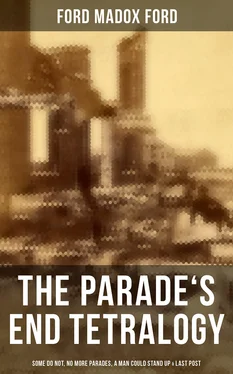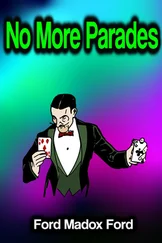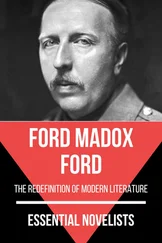‘I imagine so.’ The brandy warmed his chest in its descent. Macmaster said:
‘Better have another.’
Tietjens answered:
‘Yes. Thanks.’
Macmaster went on with his breakfast and his letters. So did Tietjens. Ferens came in, removed the bacon plates and set on the table a silver water-heated dish that contained poached eggs and haddock. A long time afterwards Tietjens said:
‘Yes, in principle I’m determined to. But I shall take three days to think out the details.’
He seemed to have no feelings about the matter. Certain insolent phrases in Sylvia’s letter hung in his mind. He preferred a letter like that. The brandy made no difference to his mentality, but it seemed to keep him from shivering.
Macmaster said:
‘Suppose we go down to Rye by the 11.40. We could get a round after tea now the days are long. I want to call on a parson near there. He has helped me with my book.’
Tietjens said:
‘Did your poet know parsons? But of course he did_ Duchemin is the name, isn’t it?
Macmaster said:
‘We could call about two-thirty. That will be all right in the country. We stay till four with a cab outside. We can be on the first tee at five. If we like the course we’ll stay next day: then Tuesday at Hythe and Wednesday at Sandwich. Or we could stay at Rye all your three days.’
‘It will probably suit me better to keep moving,’ Tietjens said. ‘There are those British Columbia figures of yours. If we took a cab now I could finish them for you in an hour and twelve minutes. Then British North Africa can go to the printers. It’s only 8.30 now.’
Macmaster said, with some concern:
‘Oh, but you couldn’t : I can make our going all right with Sir Reginald.’
Tietjens said:
‘Oh yes, I can. Ingleby will be pleased if you tell him they’re finished. I’ll have them ready for you to give him when he comes at ten.’
Macmaster said:
‘What an extraordinary fellow you are, Chrissie. Almost a genius!’
‘Oh,’ Tietjens answered: ‘I was looking at your papers yesterday after you’d left and I’ve got most of the totals in my head. I was thinking about them before I went to sleep. I think you make a mistake in over-estimating the pull of Klondyke this year on the population. The passes are open, but relatively no one is going through. I’ll add a note to that effect.’
In the cab he said:
‘I’m sorry to bother you with my beastly affairs. But how will it affect you and the office?’
‘The office,’ Macmaster said, ‘not at all. It is supposed that Sylvia is nursing Mrs Satterthwaite abroad. As for me, I wish . . . ’—he closed his small, strong teeth—‘I wish you would drag the woman through the mud. By God I do! Why should she mangle you for the rest of your life? She’s done enough!’
Tietjens gazed out over the flap of the cab.
That explained a question. Some days before, a young man, a friend of his wife’s rather than of his own, had approached him in the club and had said that he hoped Mrs Satterthwaite—his wife’s mother—was better. He said now:
‘I see. Mrs Satterthwaite has probably gone abroad to cover up Sylvia’s retreat. She’s a sensible woman, if a bitch.’
The hansom ran through nearly empty streets, it being very early for the public official quarters. The hoofs of the horse clattered precipitately. Tietjens preferred a hansom, horses being made for gentlefolk. He had known nothing of how his fellows had viewed his affairs. It was breaking up a great, numb inertia to enquire.
During the last few months he had employed himself in tabulating from memory the errors in the Encyclopaedia Britannica , of which a new edition had lately appeared. He had even written an article for a dull monthly on the subject. It had been so caustic as to miss its mark, rather. He despised people who used works of reference; but the point of view had been so unfamiliar that his article had galled no one’s withers, except possibly Macmaster’s. Actually it had pleased Sir Reginald Ingleby, who had been glad to think that he had under him a young man with a memory so tenacious and so encyclopaedic a knowledge . . . That had been a congenial occupation, like a long drowse. Now he had to make enquiries. He said:
‘And my breaking up the establishment at twenty-nine? How’s that viewed? I’m not going to have a house again.’
‘It’s considered,’ Macmaster answered, ‘that Lowndes Street did not agree with Mrs Satterthwaite. That accounted for her illness. Drains wrong. I may say that Sir Reginald entirely—expressly—approves. He does not think that young married men in Government offices should keep up expensive establishments in the S.W. district.’
Tietjens said:
‘Damn him.’ He added: ‘He’s probably right though.’ He then said: ‘Thanks. That’s all I want to know. A certain discredit has always attached to cuckolds. Very properly. A man ought to be able to keep his wife.’
Macmaster exclaimed anxiously:
‘No! No! Chrissie.’
Tietjens continued:
‘And a first-class public office is very like a public school. It might very well object to having a man whose wife had bolted amongst its members. I remember Clifton hated it when the Governors decided to admit the first Jew and the first nigger.’
Macmaster said:
‘I wish you wouldn’t go on.’
‘There was a fellow,’ Tietjens continued, ‘whose land was next to ours. Conder his name was. His wife was habitually unfaithful to him. She used to retire with some fellow for three months out of every year. Conder never moved a finger. But we felt Groby and the neighbourhood were unsafe. It was awkward introducing him—not to mention her—in your drawing-room. All sorts of awkwardnesses. Everyone knew the younger children weren’t Conder’s . A fellow married the youngest daughter and took over the hounds. And not a soul called on her. It wasn’t rational or just. But that’s why society distrusts the cuckold, really. It never knows when it mayn’t be driven into something irrational and unjust.’
‘But you aren’t ,’ Macmaster said with real anguish, ‘going to let Sylvia behave like that.’
‘I don’t know,’ Tietjens said. ‘How am I to stop it? Mind you, I think Conder was quite right. Such calamities are the will of God. A gentleman accepts them. If the woman won’t divorce, he must accept them, and it gets talked about. You seem to have made it all right this time. You and, I suppose, Mrs Satterthwaite between you. But you won’t be always there. Or I might come across another woman.’
Macmaster said:
‘Ah!’ and after a moment:
‘What then?’
Tietjens said:
‘God knows . . . There’s that poor little beggar to be considered. Marchant says he’s beginning to talk broad Yorkshire already.’
Macmaster said:
‘If it wasn’t for that . . . That would be a solution.’
Tietjens said: ‘Ah!’
Читать дальше












